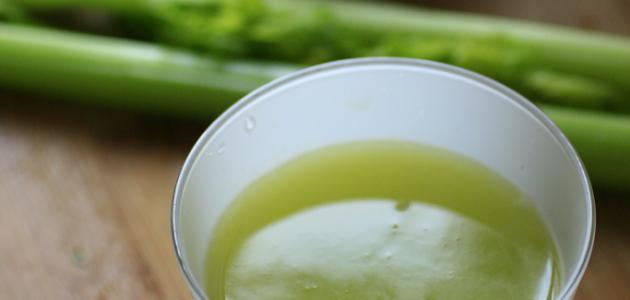Contents
Celery
Celery is a plant from the Umbelliferae family, [1] which is a family that includes dill, parsley , parsley , parsley, carrots, parsley, fennel, and coriander. [2] It is known by the scientific name (Apium graveolens), and it is one of the plants used. It has been in folk medicine since ancient times, and celery has great health benefits and great nutritional values. [1] Europe, extending from England and Lapland to southern Russia , is considered the original home of celery , and it grows in western Asia, reaching eastern India, southern and northern Africa, and South America, and it grows wild in North America, Mexico and Argentina. [3]
The nutritional composition and active substances in celery
The following table represents the nutritional composition for every 100 grams of raw celery: [4]
| The food component | the value |
|---|---|
| water | 95.43 g |
| energy | 16 calories |
| Protein | 0.69 g |
| Fats | 0.17 g |
| Carbohydrates | 2.97 gm |
| Dietary fiber | 1.6 g |
| Total sugars | 1.34 gm |
| Calcium | 40 mg |
| Iron | 0.20 mg |
| magnesium | 11 mg |
| Phosphorous | 24 mg |
| Potassium | 260 mg |
| Sodium | 80 mg |
| Zinc | 0.13 mg |
| Vitamin C. | 3.1 mg |
| Thiamine | 0.021 mg |
| Riboflavin | 0.057 mg |
| Niacin | 2,605 mg |
| Vitamin B6 | 0.074 mg |
| Folate | 36 mcg |
| Vitamin B12 | 0 mcg |
| Vitamin A | 449 universal units, or 22 micrograms |
| Vitamin E (alpha-tocopherol) | 0.27 mg |
| Vitamin D. | 0 global units |
| Vitamin K. | 29.3 mg |
| Caffeine | 0 mg |
| Cholesterol | 0 mg |
The previous table shows that celery is a good source of dietary fiber , niacin, vitamin A, vitamin K, folic acid, potassium, calcium, and sodium, and it also contains vitamin C. [4]
Celery herb contains many active substances, which include volatile oil and its components, some flavonoids, some furocoumarin and caffeic acid derivatives, [3] and celery seed contains many active substances as well, which They include furocoumarins, phenols, and volatile oils, and their seeds, leaves and stem contain some oils that include volatile oil and some fatty acids . [1]
Celery Benefits
Celery gives many health benefits to the human body, and it is used in many therapeutic purposes by many, and its health benefits, which have been found by scientific research, include the following:
- Celery is effective in relieving menstrual pain and duration when eating its seeds in a product that also contains anise and safflower. [5]
- Using fats containing celery extract will help keep insects away from the body. [5]
- Some studies indicate a role for celery in relieving muscle and joint pain, but this effect needs more scientific research. [5]
- Some studies have found a role for celery in headaches , but this effect needs more scientific proof. [5]
- Celery seed extract has antioxidant activity. [1]
- Some studies have found a role for celery in cases of gout, but this effect needs more scientific proof. [5]
- Some studies have found a role for celery in states of nervousness and fatigue, but these roles need more scientific proof. [5]
- Some studies have also found a role for celery in cases of fluid retention in the body. [5]
- Some studies have found a role for celery in regulating bowel movements, expelling gas, and aiding in digestion. [5]
- Some studies have found a role for celery in stimulating the menstrual cycle, and in reducing the production of breast milk, and these roles also need more scientific research. [5]
- Some studies have found a role for celery as a sleep aid , [5] and it has also been found to contribute to alleviating hysteria, as it has been found to act as a depressant for the central nervous system. [1]
- It can stimulate the appetite. [5]
- Protects testicular cells from the toxic effects of a drug used in cases of epilepsy. [1]
- Celery can regulate the heart. [1]
- Celery can stimulate the pancreas to secrete insulin and regulate blood sugar, and thus it can be used to reduce or treat complications of diabetes. [1]
- It can reduce celery from the level of cholesterol total and bad cholesterol (LDL) and triglycerides [1] lipoprotein low very density (VLDL), while some studies have found that it contributes to raising the level of good cholesterol ( the HDL), [6] and according to what I found Some studies conducted on experimental animals.
- Celery can help prevent fatty liver disease. [1]
- Celery combats inflammation and pain relief. [1]
- It contributes to protecting brain cells from the effect of insufficient oxygen delivery caused by insufficient blood supply to the brain cells (Ischemic brain). [1]
- Celery acts as a diuretic. [1]
- Celery helps treat excess weight. [1]
- Celery helps relieve cases of pneumonia. [1]
- Celery lowers blood pressure . [1]
- Celery has found anti-fungal effects. [1]
- Some studies in rats have found the ability of celery extract to prevent intestinal ulceration. [6]
- Laboratory studies have found antibacterial effects of celery extract and oil. [6]
- Some studies in experimental animals have found that celery reduces plaque formation in artery walls. [6]
- Some laboratory research has found that celery extract has a toxic effect on cancer cells. [6]
- Celery intake reduces the risk of developing cardiovascular disease. [1]
Side effects and contraindications for celery
Celery is considered a safe food when it is eaten in the usual quantities in the diet, and its use in therapeutic doses is also considered safe for short periods, but it can cause skin irritation and can increase sensitivity to the sun. [5] And care must be taken when eating celery in the following cases: [5]
- Pregnancy : Eating celery seeds and oil in therapeutic doses is not safe during pregnancy, and eating large amounts of it can cause contractions in the womb that may cause miscarriage, and therefore it should be avoided in therapeutic doses.
- Lactation : There is no information on the safety of eating celery seed and its oil during the breastfeeding period, so they should be avoided as a precaution.
- Bleeding disorders : Taking celery in medicinal doses can increase the risk of bleeding in people with bleeding disorders, so they should avoid this.
- Kidney problems : Eating celery in medicinal doses can cause inflammation, and therefore it should be avoided by people with kidney problems and disorders .
- Cases of low blood pressure : Eating celery in high doses can cause a decrease in blood pressure, and this may lead to a significant decrease in blood pressure in people who suffer from low blood pressure, and therefore it should be avoided in this case with therapeutic doses.
- Surgical operations : You should stop eating celery in high quantities at least two weeks before the dates of surgical operations, due to its effects on the central nervous system, which can cause with the anesthetics used in surgical operations to depress the central nervous system significantly.
Drug interactions of celery
Celery can reduce the effectiveness of the drug (Levothyroxine), which is used to treat hypothyroidism, and it also interacts with the drug lithium. Whereas, the diuretic effect of celery increases the concentration of lithium in the body, which increases the chance of developing dangerous side effects of this drug. Also, celery interacts with all drugs that increase sensitivity to sunlight in a way that increases the risk of sunburn and rashes, and among the drugs that increase sensitivity to the sun are: Amitriptyline, Ciprofloxacin, Norfloxacin, and Norfloxacin. Lomefloxacin, Ofloxacin, Levofloxacin, Sparfloxacin, Gatifloxacin, Moxifloxacin, Trimethoprim / sulfamethoxazole, Methoral-8 , 8-MOP, Oxsoralen) and Trioxsalen. [5]
Celery also interacts with anesthetic drugs that depress the central nervous system. As this interaction may result in severe drowsiness , some of these drugs include the following: (Clonazepam), (Lorazepam), (Phenobarbital), and (Zolpidem), among others. [5] And you should consult your doctor before consuming celery in therapeutic doses, especially if you are taking any of the above mentioned medicines.
Note : This article is not a medical reference, nor is it a substitute for consulting a doctor.
References
- ^ A b t w c h x d y t g o u r z i J p Kooti W . Et al . ., "A Review , On Medicinal Of Apium Fty Graveolens", the Advanced Medicine Herbal Remedies Store : , . Page . 48-59. Edited.
- ↑ "The Umbelliferae Family" , organics for all . Edited.
- ^ A b The Fleming t, the PDR For Herbal Remedies Store : Medicines , 172-173 . Page. Edited.
- ^ A b "Food Composition the USDA the Databases" , Ndb . Edited.
- ^ A b t w c h x d y t g o u r z " the Find of a Or the Vitamin Supplement: CELERY" , WebMD . Edited.
- ^ A b t w c Al-Flutab the AE, "The Pharmacology Of Apium Graveolens", International Journal Unit For Pharmaceutical Research Scholars , 671-677 . Page. Edited.










